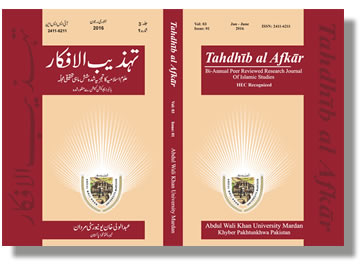خواتین سے متعلق قبائلی رسوم ورواج فقہ السیرۃ اور پاکستانی قوانین کے تناظرمیں ایک جائزہ
Tribal Rites and Customs Related to Women: A Review in the Context of Fiqh Al Sῑrah and Pakistani Laws
Abstract
Allah Almighty made man and woman a source of peace for each other, but this goal can be achieved if both sexes respect each other's rights, which order has given by the Islamic law to everyone. The rights preserved by Sharῑ‘ah are the guarantee of a peaceful family and social life. But unfortunately in the tribal areas the women are deprived of their basic rights and freedoms. As a result the women of these areas are suffering from various Psychological and mental diseases and on the basis of these facts women are unable to fulfill their social responsibilities which is an injustice to a healthy society. Although different organizations have been working for women's rights and laws are being made through the Legislative Assemblies, and till now no significant improvement has been made in the situation of tribal women. Before the revelation of the Holy Prophet, the society had fallen into these rituals and The Prophet S.A.W very wisely put an end to the cruel tribal traditions and customs by presenting himself as a role model. Therefore, even in the present era Women's secure lives and legitimate rights is possible when a permanent solution to this problem should be searched in light of Sῑrah. In this regard, the existing laws in Pakistan should also be reviewed to find out how these laws can be made more effective in respect of women tribal rituals and customs. In this research paper these things are discussed in detail.





